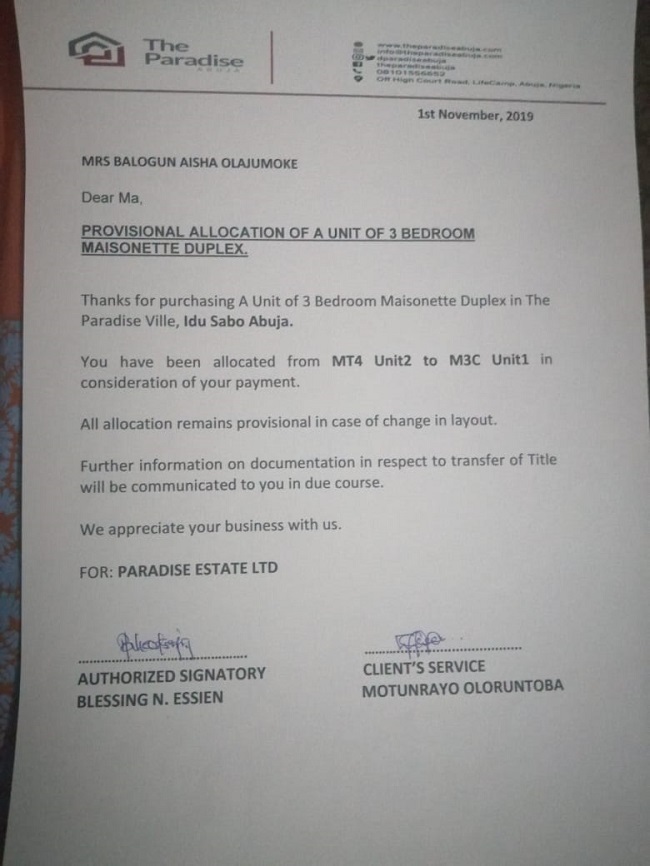...To get all news updates, Join our WhatsApp Group (Click Here)
Also Join our WhatsApp Channel (Click Here)
Continuation of https://www.societyreporters.com/richard-nyongs-lekki-gardens-linked-to-n9-9m-fraud-allegation-in-estate-deal/
The Paradise Estate, Abuja, is a brainchild of the Lekki Gardens, a frontline real estate firm based in Lagos, Nigeria.
In August 2015, when it berthed in Abuja, the vision was to deliver about 100, 000 housing units by 2018 and one million by 2023. It is not certain if this goal has been achieved.
The LinkedIn Page of Blessing Nyong-Essien shows that she is the MD of the Paradise Estate. owned by Life Camp Paradise Estate. She is also a signatory to the company’s account.
An attempt to establish the actual owners and shareholders of the Life Camp Paradise Estate, showed that the company has been inconsistent with its name.
For instance, the name found on Aishat’s payment document – The Life Camp Paradise Limited – was different from the name – The Paradise Abuja found on the letterhead containing the official allocation of a unit of the three-bedroom duplex to the complainant.
The name, Paradise Estate Limited, was subjected to public search and it showed a firm registered at 15, Erie Street, Off Sakonba road, Benin City, on June 26, 2002, with registration number 455426. It has only two directors, Arigbe Ebuwa and Ibude Osazee.
A similar search was conducted on The Life Camp Paradise Limited. The findings showed it was registered on May 6, 2016, with two persons – Imeh Christiana Amida and Stella-Marie Omogbai – as directors of the company as well as the shareholders.
Amida, in 2015, as the Chief Operating Officer of Lekki Gardens announced the launch of the Paradise Estate located in Abuja.
She said, “The Paradise is a new lifestyle community conceived to provide Abuja’s growing upwardly mobile middle class the rare privilege of owning choice homes at extremely low prices just like we have done in Lagos and Port Harcourt.
Amida further explained that the new project was necessitated by the demand for the Lekki Gardens debut project – Games Paradise –, which sold out barely one month after it was launched, The Guardian reported.
Findings based on information gathered from multiple sources showed the Lekki Gardens Estate Limited referenced by Amida is owned by multiple directors – which includes Richard Nyong, Olusola Nyong, Hon. Gbenga O., Engr. Kemi A. and Christiana Amida M.


Richard in an interview with City People, a lifestyle platform was described as “the chairman of The Paradise, Abuja”.
Nyong-Essien manages the Paradise Estate introduced in Abuja in 2015 and there is a likelihood that the three persons are related based on our findings.
Richard is linked to five other firms – Lekki Springs Limited, Get Too Rich Investment Limited, Lekki Gardens Facility Management Limited, Lekki Gardens Emporium Limited, and Lekki Gardens Horizons Limited.
His fellow director, Olusola, has interests in about seven others. They include Get Too Rich Investment Limited, Lekki Gardens Facility Management Limited, Lekki Gardens Emporium Limited, Lekki Gardens Horizons Limited, Lekki Palms Limited, Lekki Springs Limited, Lekki Gardens Horizon Limited, and Lekki Gardens Estate limited.
Paradise Estate firm reacts
When contacted, Paradise Estate’s client service officer, who had done repeated mail exchanges with the aggrieved couple, Eniola Olaoye, did not respond to calls and a text message sent to her phone number.
Nyong-Essien, the authorised signatory in the entire deal, neither answered nor returned calls. This reporter further sent a text message but there was no response.
When a call was put through to her second line, a lady identified as Tosin answered but terminated it when she heard the questions. This reporter later called back but she advised The ICIR to visit the office.
Tosin, who later introduced herself as a personal assistant to Nyong-Essien, was asked to book an appointment since her MD had gone incommunicado. She was briefed about the purpose of the meeting, including the allegation that the firm was fraudulent. But she has not responded to date.
Meanwhile, Aisha Ahmed, the account officer that earlier introduced Aishat Balogun to the Paradise Estate, simply attributed the situation to ‘force majeure.’
Force majeure in business is a situation where a force of nature or unforeseen circumstances prevent someone or a party from fulfilling his or her part of an agreement. It is usually a clause mostly embedded in contract agreements.
“Her house is ready,” Ahmed stated when asked when the property would be handed over.
“It is just for them to work on the infrastructure. In fact, an email has been sent to her and other affected persons.”
This reporter reminded her that despite repeated emails previously sent to the subscribers including Balogun, the company still reneged on its agreements.
She was also reminded of the need to provide a more specific date this time. But she placed the call on hold and never picked up until the reporter terminated it. Subsequent calls were ignored.
Aisosa S. Sunny-Ekos is the head of Legal Services Department in Lekki Gardens. His official email is aisosa@lekkigardens.com. He also spoke officially with respect to the controversial property meant to be delivered by the Paradise Estate, Abuja. He also faulted Ahmed’s earlier claim of force majeure when The ICIR spoke with him on a phone call on Wednesday, March 17.
“That is not true,” he said.
Meanwhile, earlier, on Thursday On March 11, 2021, the lawyer replied to the email trail reaffirming the organisation’s commitment to delivering the building through his official email aisosa@lekkigardens.com.
“Yes, I am in copy of the email trail and I believe that the commitment of our client’s service team shall be duly complied with,” he wrote in part.
“We appreciate your patience thus far in this transaction and yet appeal for some more patience to enable us to conclude on the pending infrastructure works.”
But more than a year after the response, the aggrieved couple was yet to get their building delivered.
The email trail links Paradise Estate to Lekki Gardens – much like it is being fully managed by Lekki Gardens company.
Aishat Balogun also confirmed to this newspaper about a meeting held with Nyong-Essien in October 2019.
“I met with Richard personally at Karimo Estate close to ours and, he assured me Blessing (Nyong-Essien) was capable,” she added.
He confirmed the deal, describing it as a peculiar case. But, he would not provide further detailed information.
“I am conversant with her transaction. The letter from her lawyer is currently on my table. She subscribed for a three-bedroom,” he told this reporter, but he could not still establish exactly when the house would be delivered. This was after about one hour of back and forth conversation in an attempt to verify the claims and exact owners of the firm.
Finally, on Saturday, March 19, the complainant reached out to The ICIR to announce the estate had eventually agreed to refund the money (N9.9 million paid for the structure). But this time, the firm contacted the husband, Zakari.
The email, with the subject ’90 days paradise refund’ had an attachment of a refund application form.
The form’s content read with five conditions, among which was that the “refund repayment timeline is over a 90-day period.” Besides, it added, “interest is not payable on a refund.”
But the family kicked. “It’s so unfair collecting N9.9m after 40 months,” Balogun frowned.
“I want a property or the current value of the said property as of today. That is our position.”
(The ICIR)
Also, the provisional allocation signed by Nyong-Essien and Motunrayo Oloruntoba was on behalf of Paradise Estate Limited, this is also a different name from that of the letterhead.
You can get every of our news as soon as they drop on WhatsApp ...To get all news updates, Join our WhatsApp Group (Click Here)
Also Join our WhatsApp Channel (Click Here)

















